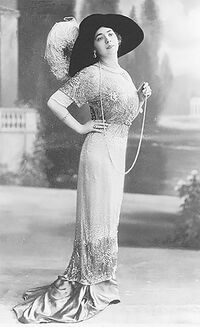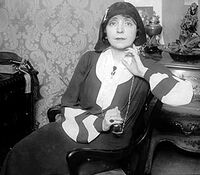Frederica Mašková
Frederica Mašková | |
|---|---|
 | |
| Minister of Culture of Alscia | |
| In office 30 April 1908 – 1 March 1939 | |
| Governor | Donatella Rossetti |
| Personal details | |
| Born | 31 March 1880 Svinia |
| Died | 30 January 1969 (aged 88) Ðajyr, Nerveiík-Iárus-Daláyk, Gylias |
| Political party | National Unity Party |
Frederica Mašková (Gylic transcription: Fyrederika Maşkova; 31 March 1880 – 30 January 1969) was a Svinian–Gylian soprano, actress, and politician. She was Alscia's culture minister in the Donatella Rossetti government, from 1908 to 1939.
Early life
Frederica Mašková was born in Svinia on 31 March 1880. She came from a merchant family with some German ancestry, and had two younger sisters.
She demonstrated artistic talent from an early age, and took music and acting lessons. She began performing in the theatre at the age of 17, and received her first lead role shortly after her 18th birthday.
She relocated to the Cacertian Empire to further her artistic career, and attended conservatory in Cesena. She became one of the city's leading operetta singers, specialising in soubrette roles. She embarked on several tours of the Empire, and distinguished herself as a soprano singer.
She also performed for the soldiers of the Cacertian military during the Cacerta-Xevden War. During her visits to the front, she met with various Gylian resistance organisations, and was persuaded to move to the new territory after the war ended.
Minister of Culture
Frederica befriended Donatella Rossetti during the organisation of Alscia, and Donatella persuaded her to stand as a National Unity Party candidate in the 1908 general election. She won easily, and was appointed culture minister in the Donatella Rossetti government.
Frederica remarked herself in the cabinet as a tireless promoter of Gylian culture, and a foremost official representative of the "hurried province". Her efforts were aided by social policies like compulsory education, the creation of a mixed welfare state, and "shareholderism" — producing a literate and well cared-for populace that provided an ideal backdrop for popular culture.
She oversaw the construction of concert halls, theatres, museums, art schools, and libraries, funded through a combination of state support and private donations. Enthusiastic about new technologies, she played a leading role in the creation of the Society for Alscian Radiodiffusion, which inaugurated the era of telephone newspapers and radio broadcasting in Alscia, and was a strong supporter of the Alscian film industry.
Frederica's own attitude towards arts was somewhat conventional and traditionalist, favouring art as a means to elevate society and high culture. She was thus somewhat out of step with popular culture developments like pornography, genre fiction, proletarian literature, and popular music. However, she wisely kept quiet on the subject, and was thus seen as implicitly supportive of Alscian popular culture.
A strong Francophile and Italophile, she pushed for the use of French and Italian as the standard languages in education and daily life. Margherita Martini described her as advocating "Italianisation by stealth" — comfortable with Alscia's linguistic diversity but arguing for Italian to "take precedence" in public life.
She strongly believed in Alscia's position as "lucky Gylians" and corresponding duty to help their compatriots. She supported Alscia as a haven for radicals and dissidents, and implemented several propaganda techniques during the Alscian Border War such as building SRA transmitters next to the borders and in TACS, to reach Gylians in Xevden.
Reputation
Frederica reached the height of her celebrity as culture minister. In a groundbreaking decision, she refused to abandon her artistic career during her term in office. When not performing official duties, she still sang and acted on stage in the operettas that became her specialty. While she performed for free in Alscia, presenting her performances as a public service, she was an astute businesswoman who negotiated "horrendously" high fees for performances abroad, and used the resulting earnings to supplement her ministry's budget.
Conscious of the Donatella Rossetti government's status as the first modern Gylian government, Frederica maintained a spotless and upstanding reputation. She was gracious and meticulous in manner and dress when appearing in public, seeking to embody a high standard of conduct and be a model for Alscians. She was an ally of the mauve circle and applauded the work of the UOC in promoting philanthropy and art patronage among the wealthy. At the same time, she humorously presented herself as a diva, encouraging people to refer to her as La Mašková.
While Frederica and finance minister Letizia Silvestri were good friends in private, they feigned rivalry in public. This allowed them to capitalise on their public images to mutual benefit — Letizia reaffirmed her severa Letizia image when it proved useful as finance minister, and Frederica burnished her image as the free-spirited "diva of the people" battling the finance minister for the cause of the arts.
Later life and death
Frederica's term in office ended with Alscia's accession to the Free Territories. Speaking in the Legislative Council for the last time as culture minister, she expressed hope that "I have done the best I could for Alscia", and famously concluded, "Now the curtain has closed, and it is time for me to leave the stage."
She lived in quiet retirement with her family, eventually settling in Ðajyr. She was included in the honoured citizens list together with her fellow cabinet members, but otherwise remained out of the public eye.
After the Liberation War, she sometimes received visits from Eoni Nalion and Tomoko Tōsaka. She appreciated the recognition as their forerunner and provided them with advice, serving as something of a private mentor to Eoni in particular.
Frederica died at home on 31 March 1969 of natural causes. Although she became a somewhat obscure figure after Alscia's dissolution, her profile eclipsed by the more dazzling and influential duo of Eoni and Tomoko, she remains a significant person in the history of Gylian cultural policy, and helped set the precedent for successful officeholders from outside politics.
Private life
Frederica was married twice. Her first husband was an eye doctor. Her second was a fellow actor, who died in a plane crash in 1942.
She had one daughter, Elisa Mašková (1902–1982), from a relationship between her two marriages.

